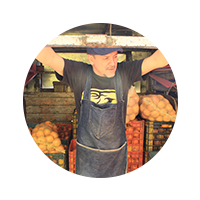Representative of vendors association.
One Tuesday I was talking to Roberto’s brother, Gabriel, who owns the stall that sells pineapples, right next to Roberto’s orange stall. He showed me a newspaper article in the entertainment section. In it, a cartoon figure of a superhero crossed the page from top to bottom. ‘Hey Pao! This is it! Come, come and see’, Gabriel called me with a mischievous smile on his face, which was partly covered by the baseball cap he usually wears. I asked, ‘What am I seeing, Gabriel?
He pointed emphatically at the newspaper: ‘There he is! This is
Kalimán. The character I was telling you about. This is Roberto, and this is me, Solín!’ He smiled ironically. The newspaper showed a drawing of a man fully dressed in white, wearing a white turban with the letter K positioned on his forehead, the initial of his name, Kalimán. Kalimán is the protagonist of a famous Mexican comic book of the same name, created in the 1960s by Rafael Cutberto Navarro, writer and owner of National Radio Cadena Nacional S.A., and writer Modesto Vázquez. Next to him, at a much smaller scale, was a drawing of Solín, Kaliman’s apprentice, a boy wearing a fez. Gabriel explained:
“You see, Kalimán is the superhero, he has mental powers and he is interested in arts and culture, like Roberto. Kalimán confronts the enemies. Me? No. I prefer not to get into trouble. Dealing with other vendors, neighbours, authorities – it is too stressful! Roberto wants to fix the world. He reads, he likes museums, he doesn’t drink. I like football; I like my palomas [tequila with grapefruit soda], I like to party. I am just his helper. Like Solín, I am his chalán, his helper.”
Roberto is the oldest of three brothers, followed by Gabriel and then Jorge.
With a slim complexion, green eyes, light skin and goatee, and always wearing a flat hat, he stands out from the rest of the vendors. Like his brother, he talks abundantly and fast with a trace of the accent of Veracruz, from where his family originally comes from. In his 50s, Roberto is the current representative of Route 8. When I first came to the market, he had been in this role for six months. He introduced himself as a ‘temporary representative’, substituting for his father. After more than 25 years in the position, his father suffered a stroke that paralyzed half of his body and took him away from his job in the tianguis. Both Roberto and Gabriel believe that the stroke was caused by the stress of tianguis’ responsibilities and problems. Those responsibilities include collecting the daily fees for the use of space, paying that money to the corresponding person (government or the owner of the space), ensuring that vendors are using the space as established by their authorisation documents, mediating when conflicts appear in regards to public servants and neighbourhoods committees, taking care of rubbish collection and street cleaning, and communicating with other tianguis’ representatives and attending La Coordinadora meetings (a citywide civil association of tianguis representatives). This list of duties is the reason Gabriel points to his brother’s mental powers when Roberto decided to take the lead.




